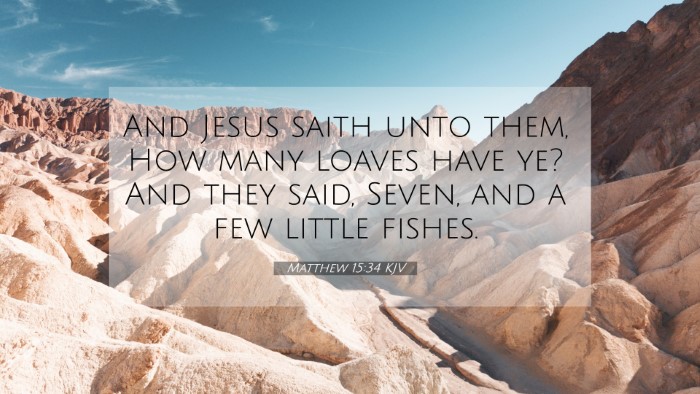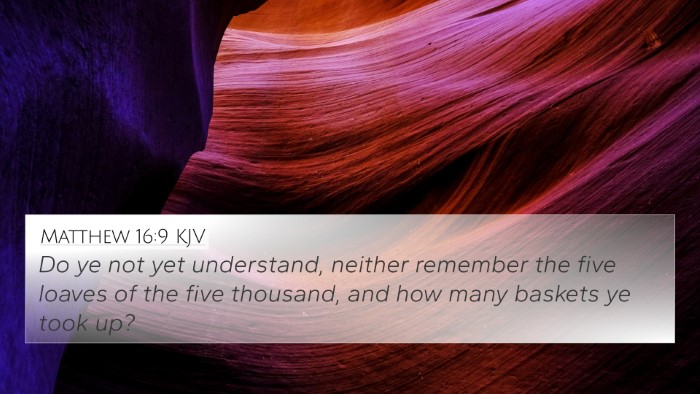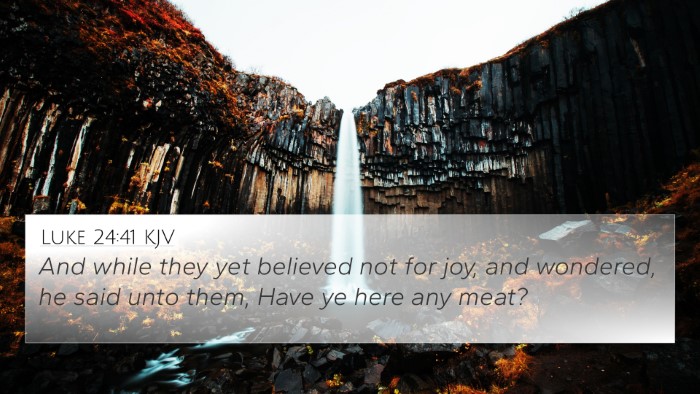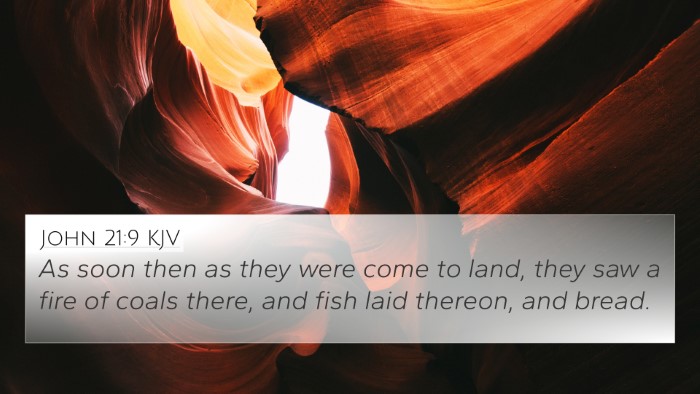Understanding Matthew 15:34
Bible Verse: Matthew 15:34 - "And Jesus said unto them, How many loaves have ye? And they said, Seven, and a few little fishes."
Summary of the Verse
This verse occurs during the account of the feeding of the 4,000 where Jesus performs a miracle by multiplying the loaves and fish. The inquiry about how many loaves the disciples have suggests an emphasis on resource assessment before divine provision manifests.
Contextual Analysis
The context surrounding Matthew 15:34 is crucial for understanding its significance. Jesus, moving through the region of the Decapolis, witnessed the multitude who had been following Him for three days, drawn by His teachings and miracles. Recognizing their physical need for sustenance, Jesus prompts His disciples to assess their available resources.
Insights from Public Domain Commentaries
Matthew Henry: Henry describes how Jesus, aware of the people's hunger, shows His compassion not only by teaching but also by addressing their physical needs. His question to the disciples about the loaves reflects his desire to demonstrate reliance on God’s provision; the disciples’ response, "Seven, and a few little fishes," indicates a limitation. However, Jesus’ subsequent action illustrates that even the smallest resources, when placed in His hands, can achieve miraculous outcomes.
Albert Barnes: Barnes highlights that this verse illustrates the nature of Christ’s ministry. He had the power to provide abundantly, yet He asks the disciples about their available resources to teach them a lesson in faith and trust. The phrase "a few little fishes" suggests the insignificance of their offerings compared to the need before them, yet this is the very medium through which Jesus chooses to perform His miracle.
Adam Clarke: Clarke notes that this incident draws parallels to the earlier miracle of feeding the 5,000, emphasizing the recurring theme of Jesus’ provision. Clarke emphasizes that this miracle, like the earlier one, stresses the importance of bringing what one has to Jesus, which then becomes sufficient through His power. The mention of "seven" and "a few little fishes" also has allegorical significance, as seven often symbolizes completeness in biblical texts.
Bible Verse Cross-References
This verse connects to various other scripture passages that illustrate themes of divine provision, scarcity turned to abundance, and reliance on God’s resources. Here are notable cross-references:
- Matthew 14:17-21: The earlier feeding of the 5,000.
- John 6:5-13: Jesus asking Philip about buying bread to feed the multitude.
- Mark 6:38: A similar query concerning resources before a miracle.
- 2 Kings 4:42-44: Elisha feeding a hundred men with a few loaves.
- Psalm 37:25: The righteous not being forsaken nor their children begging for bread.
- Matthew 6:11: "Give us this day our daily bread," illustrating God’s provision.
- Luke 9:12-17: Another account of feeding the multitude.
- Philippians 4:19: "My God shall supply all your needs," emphasizing God’s care.
- John 10:9: Jesus as the bread of life, providing for spiritual sustenance.
- Revelation 3:20: Christ's invitation to partake, illustrating sustenance and provision.
Thematic Connections
Thematic connections are observed in this verse when examining the central themes of provision, faith, and the miraculous. The interactive dialogue between Jesus and the disciples highlights the important Biblical principle of bringing our needs to God, which leads us to have faith in His ability to provide, even when resources seem insufficient.
Practical Applications
For contemporary readers, Matthew 15:34 serves as a reminder of the importance of assessing our resources and faithfully offering them to God. It teaches that God often uses what we consider inadequate for great purposes.
Conclusion
Matthew 15:34, while a simple question initiated by Jesus, invites deep reflection on His provision and sufficiency. As seen through various Scriptures, the connections made with this verse can inspire faith in God’s ability to meet our needs in miraculous ways. Through cross-referencing and understanding overlapping themes throughout the Bible, believers can gain a comprehensive view of God's continuous provision and care.





